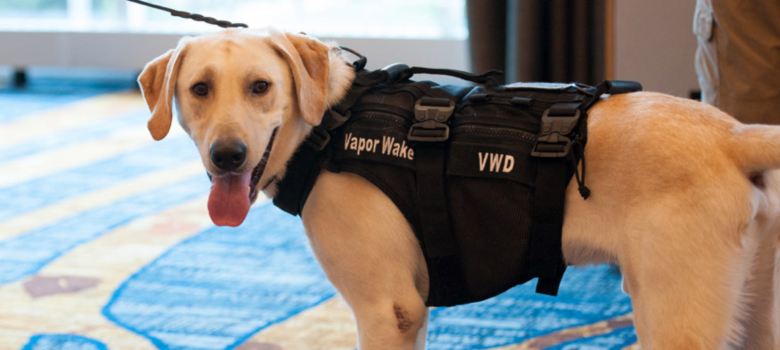By Gianna Korpita
Tragedy has struck large crowds numerous times throughout history: September 11th, 2001—The World Trade Center Attacks; April 15th, 2013—The Boston Marathon Bombing; October 1st, 2017—The Las Vegas Shooting. These days will not be remembered as days of joy and happiness, but will forever be a reminder of pain and fear. But, what if America could essentially eliminate these acts of terrorism? What if America could prevent these threats to our citizens? Is it possible to implement science in a way that could forever change how we view national security? Many security professionals and scientists think so and agree that “Vapor Wake” dogs are the next best thing to preventing these deadly attacks.
Scientists and canine-training experts at the Auburn University College of Veterinary Medicine have received a U.S. patent to employ Vapor Wake detector dog technology. Vapor Wake is a scientifically-based method for selecting, training, and commissioning dogs for the detection of hand-carried and body-worn explosive devices and illicit substances. This patent, number US 8,931,327 B2, is currently the only patented technology to detect body worn explosives in transit, which means that these dogs can detect explosives while the target is in motion throughout a large crowd.
Vapor Wake dogs work in airports, sports stadiums, concert arenas, and any other locations where there are large crowds of people that require rapid screening. Due to the significant interactions with people, Auburn chose the well-liked and easily identifiable Labrador Retriever. This breed exhibits a kind demeanor and a good temperament which are both optimal for training and employing.
Everything emits an odor. Some odors are very detectable to the human nose, while other odors are so faint that not even a sophisticated machine can detect them. This is when trained dogs come into play. When people move, they emanate warm air that trails behind them. Under the right conditions, the specially trained Vapor Wake dogs can sniff a person’s body heat for particles and odors several minutes after the odor has been released. With this odor detection, the dogs can identify a suicide bomber within a stadium of tens of thousands of people. They can detect the chemicals contained in the devices and can track down the device.
A traditional Explosion Detection Dog (EDD) is led by his handler with his nose to the ground, only sniffing one object or person at time. Unlike a traditional EDD, a Vapor Wake dog works with his nose pointed up into the air, leading the handler to the source of the scent or odor. This odor-sniffing process allows the dogs to screen thousands of people at a single-entry point at one time. Although Vapor Wake dogs are primarily trained to sniff the air for moving explosive chemicals and follow the scent of the object or person, the dogs are also able to perform traditional bomb detection searches of stationary objects, just like EDDs.
Auburn University breeds puppies based on genetic research through selective breeding. Once the puppies are born, their training begins. At three months, the puppies begin human bonding and are sent to local prisons where they interact with inmates. This bonding process lasts until the pups are about one year old. Simultaneously, during the first six to twelve months of life, the puppies go through extensive social and environmental raising, supervised by the Canine Performance Sciences staff. The staff look for the physiological, psychological, and sociological traits that would suggest that the dogs would excel in the odor detection process. The puppies are exposed to a variety of circumstances that will prepare them to work in loud and crowded situations without losing focus on the odor detection process. The puppies also undergo a special physical and nutrition program as part of their training. After their year under Auburn University’s program, the American K-9 Detection Services, LLC takes the dogs to their facilities and continues to train the dogs under the patented odor detection program. The entire training process can last around 18 months, and the cost for a dog can be upwards of $50,000.
So, what does this mean for our national security? Terrorism is a daily concern. Our nation works every day to combat acts of violence. As threats continue, especially in large crowd situations, Vapor Wake dogs can protect us. Attending a concert, going to a sporting event, or even flying on a plane illicit fear. At some subconscious level, there is always the thought that something could go wrong. There is always that underlying idea that we could be involved in the next terrorist attack. Used by NYPD officials at the 2017 Macy’s Thanksgiving Day Parade, and again as the clock struck midnight into 2018 in Times Square, these trained dogs proved to be successful. If these dogs were to be employed on an even larger-scale national level, maybe this fear could be alleviated.
The Vapor Wake technology is a great example of how academia, science, and law enforcement can all work together to transform the way our country thinks about national security. Metal detectors, wand scanners, bag searches, and traditional EDD dogs are not enough; Vapor Wake dogs may be the answer. Vapor Wake dogs are a new breed of “technology.” They can change the way our country feels safe. There are endless possibilities for these dogs and our society can greatly benefit from this patented training process. After all, dogs are considered man’s best friend for a reason.
Student Bio: Gianna Korpita is currently a 2L student at Suffolk University Law School. She holds a Bachelor of Science in Business Management and Administration from Boston University. She is originally from Hackettstown, NJ and has previously worked in both banking and telecommunications prior to attending law school.
Disclaimer: The views expressed in this blog are the views of the author alone and do not represent the views of JHTL or Suffolk University Law School.

